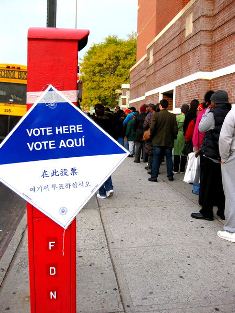 (CNN) -- Pennsylvania's state Supreme Court on Thursday took up a controversial case over the state's new voting law, which requires voters to show a photo ID before casting their ballots.
(CNN) -- Pennsylvania's state Supreme Court on Thursday took up a controversial case over the state's new voting law, which requires voters to show a photo ID before casting their ballots.
Court spokesman Art Heinz said the case, which is an appeal from a lower court's August 15 decision which upheld the law, is not expected to be resolved by Thursday.
At issue is whether the new requirement will disenfranchise voters during an election season that has already seen a series of high-profile legal challenges over voting procedures.
The law's opponents say the measure undermines potential voters and was passed without sufficient evidence of prior identity fraud.
Its proponents argue that the law instead strengthens voting procedures and protects against potential fraud.
Gov. Tom Corbett, a Republican, said the law, which he signed in March and was passed largely along party lines, "sets a simple and clear standard to protect the integrity of our elections."
After the hearing, Pennsylvania Deputy Secretary of State Shannon Royer said, "It was clear by the lower court ruling that this law is absolutely constitutional.
"Many other states around the country have voter ID laws. Pennsylvania's voter ID law was modeled after Indiana, which was implemented back in 2008 and upheld on solid legal ground. And I'm hoping based on my observations of the justices today, that they'll come to the same conclusions," Royer added.
But NAACP President and CEO Benjamin Todd Jealous contended, "When you disenfranchise tens of thousands of voters in this state -- Pennsylvania, (which) often determines who becomes president -- then you create a constitutional crisis, because you are then not just stealing the race in Pennsylvania, you're stealing the race in the country.
"You're fixing who's on the Supreme Court and you're setting the destination for civil rights for an entire generation."
First-time voters in Pennsylvania were previously identified by either photo ID or other documents, which include bank statements and utility bills.
In June, the state's House GOP leader Mike Turzai told a group of fellow Republicans that the measure would "allow Governor Romney to win the State of Pennsylvania."
Turzai's controversial comments stoked Democrat-backed criticism, who blasted the measure as being a largely partisan act, though Turzai's office has said his comment instead focused on the issue of voter fraud.
At the center of the high-profile case is Viviette Applewhite, a 93-year-old Philadelphia native without photo identification, who is the lead plaintiff in the lawsuit, according to court documents.
On Thursday, John Knorr, Chief Deputy Attorney General, said in court that all plaintiffs either have "an ID at this point, or we established have the documents needed to get one."
Meanwhile, political fights over a spate of new voting laws have reached other battleground states like Florida and Ohio, where President Barack Obama and Republican presidential candidate Mitt Romney are locked in fierce campaigns to win over voters.
In Ohio, the GOP-led state legislature did away with a three-day early voting window before Election Day for everyone but members of the military and people living overseas. But a federal judge later ruled in favor of the Obama campaign to allow voters that window.
In Florida, the Department of Justice is suing the state because it says the controversial purge of voters identified as "non-eligible" unfairly targets minorities.
Many states have also updated their voting machines to ensure that ballots are accurately counted.
- Home
- News
- Opinion
- Entertainment
- Classified
- About Us
 MLK Breakfast
MLK Breakfast- Community
- Foundation
- Obituaries
- Donate
04-18-2024 2:35 pm • PDX and SEA Weather






















































































































































































































































































































